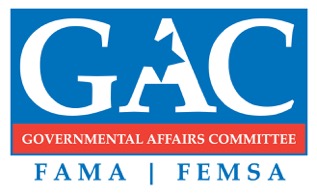Today, March 27, the House passed and the President signed H.R. 748 – the Coronavirus Aid Relief and Economic Security (CARES) Act to provide $2 trillion in support to respond to the coronavirus pandemic. This legislation was passed in the Senate on March 25. Below are key provisions in the bill pertinent to FAMA/FEMSA membership. This is a very broad-based bill, and we will continue to analyze the provisions and communicate with you on how this new legislation will impact our members and America’s fire service.
Department of Homeland Security
Disaster Relief Fund – $45 billion will support a broad array of state and local emergency response efforts related to the coronavirus pandemic, with $25 billion for areas with major disaster declarations and $15 billion for all purposes allowed under the Stafford Act.
Assistance to Firefighter Grant Program – $100 million will support the acquisition of and reimbursement for personal protective equipment for firefighters and associated emergency response personnel.
Emergency Management Performance Grant Program – $100 million will support efforts of state and local emergency managers to maintain, restore, and sustain food, water, shelter, healthcare, and transportation supply chains.
Small Business Administration
Paycheck Protection Program – $350 billion in funding (included in Division A of the bill) for a Paycheck Protection Program (PPP) that will provide small businesses and other entities with zero-fee loans of up to $10 million, with up to 8 weeks of average payroll and other costs forgiven if the business retains its employees and their salary levels. (For additional details, refer to the House Committee on Small Business.)
Emergency Economic Injury Grants – $10 billion in funding (included in Division A of the bill) for a provision to provide an advance of $10,000 to small businesses and nonprofits that apply for an SBA economic injury disaster loan (EIDL) within three days of applying for the loan.
Debt Relief for Existing and New SBA Borrowers – $17 billion in funding (included in Division A of the bill) for a provision to provide immediate relief to small businesses with standard SBA 7(a), 504, or microloans, among other relief for small business borrowers. (For additional details, refer to the House Committee on Small Business.)
Resources for Business Counseling Services – $275 million in grants (included in Division A of the bill) to Small Business Development Centers (SBDCs), Women’s Business Centers (WBCs), as well as the Minority Business Development Agency’s Business Centers (MBDCs), to provide mentorship, guidance and expertise to small businesses. (For additional details, refer to the House Committee on Small Business.)
NIST Manufacturing Extension Partnership (MEP) Program – $50 million to enable non-profit MEP centers across the country to assist small and medium-sized manufacturers hit by coronavirus and the economic downturn.
Department of Labor
The bill includes $360 million for the Department of Labor to invest in programs that provide training and supportive services for dislocated workers, seniors, migrant farm workers, and homeless veterans. This also includes funding for DOL agencies to ensure new Paid Leave and UI benefits are implemented swiftly and effectively.
Unemployment Insurance – The bill expands eligibility and benefit levels for Unemployment Insurance. Specifically:
- Allows part-time, self-employed, and gig economy workers to access UI benefits through self-attestation (“self-certification” in the bill).
- Increases weekly benefits by $600 on top of state UI benefits.
- Waives waiting weeks, so benefits flow faster.
- Provides an additional 13 weeks of federally-funded unemployment insurance benefits.
Department of Commerce
Economic Development Administration (EDA) – $1.5 billion for economic adjustment assistance, to be competitively awarded across the country, with states, local governments, tribes, economic development districts, universities, and other nonprofits eligible to apply.
Rebates and Other Individual Provisions
2020 Recovery Rebates for Individuals – The bill provides Federal Income tax rebates directly to families based on their adjusted gross income (AGI), by direct deposit or by mail. Rebate amounts will be based on AGI from the 2019 tax year. Filers who have not filed for the 2019 tax year may apply their 2018 AGI.
The provision includes:
- A one-time payment of $1,200 to individual tax filers earning up to $75,000 AGI and heads of household earning up to $112,500 AGI.
- A $2,400 payment to joint filers earning up to $150,000 AGI.
- An additional $500 to tax filers for each child under age 17.
- A reduced payment for individual filers earning over $75,000 AGI, heads of household earning over $112,500 AGI, and joint filers earning over $150,000 AGI.
If you have any questions, please contact the GAC Co-chairs:
John Granby at [email protected]
Lee Morris at [email protected]
David Durstine at [email protected]
or GAC Sr. Adviser Dave Gatton at [email protected]
